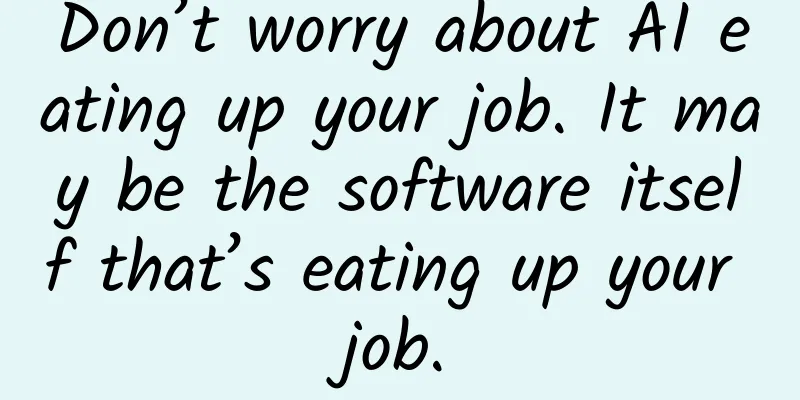Choice is more important than hard work? How to keep your job in the AI era?

|
AI has gradually moved from science fiction to reality, and has profoundly affected the lives of each of us, even causing some people to lose their jobs. Some people even lament that powerful AI will become a "replacement" for humans, taking away all jobs and making humans dispensable. It has to be said that this worry is not without reason, but humanity will never go gently into that good night, and the relationship between humans and AI does not have to be as life-and-death as in "Terminator". It all depends on how humans understand AI, how they develop AI technology, and how they coexist with AI. Today, let's talk about what jobs AI cannot do in the short term. Although AI is coming in full force, as humans we don’t need to feel inferior, because there are many jobs that AI cannot currently handle. Here are a few of them for your reference. Copyright images in the gallery. Reprinting and using them may lead to copyright disputes. healthy Health care will largely remain the responsibility of human practitioners for some time to come. In some areas of medicine, such as radiology or diagnostics, AI performs as well as or better than human doctors, but current standards of care in medicine still require human decision-makers with human responsibilities. Furthermore, patients prefer human interaction, especially in areas such as physical care. After all, we have yet to create an AI-driven robot that can perform a comfortable bed sponge bath. Not because we can’t automate robotic medical bathing—more than a decade ago, researchers at Georgia Tech created a robot that could perform sponge baths—but because most people would rather receive sympathy and care from another human being. Performing Arts Live performance, whether it’s theatre, music or dance, remains an area that benefits from the human touch. Humans are social animals and we have an inherent need to connect with one another, which can be accessed through live performances. Watching a pre-recorded performance is not the same, it loses the feedback loop between performer and audience. Unless we can create humanoid robots that closely resemble human performers, and that are also able to dynamically interact with and thus connect with audiences, we will still need human performers. After all, the connection created by a crowd of people sharing an experience is difficult to replicate in a digital environment. Copyright images in the gallery. Reprinting and using them may lead to copyright disputes. Energy Systems Installing wind farms or solar panels will still require human labor for the next decade or two. In the more distant future, robotic labor may replace humans, but for now, we still rely on human hands to erect wind towers or place panels. That is, the power industry relies on humans to implement and deploy power systems, and at least some human intervention in their maintenance. To some extent, some mechanisms still benefit from the human touch—there are conscious decisions not to give artificial intelligence full control of nuclear power plants, but rather technologies that require humans in the loop. Despite various automation links, extractive industries such as oil and coal still rely on a large amount of manpower both upstream and downstream. Construction Although I do not think that the construction industry has a strong ability to resist automation, there is indeed a view that it will take a long time for artificial intelligence to replace humans. This is partly due to the nature of the work, as the physical labor in home construction occurs in a variety of uncontrolled environments, subject to many variables, which is perfectly capable of being performed by a moderately trained young adult workforce but would be difficult for even a very expensive and sophisticated robot to handle. Retail, restaurants and other personal services Online shopping is nothing new, but people still prefer to see, touch and try on products, so Amazon has been exploring high-tech variations of real-world shopping: instead of the cumbersome checkout process, you just walk out of the store, and the wireless transmitter on your phone and the product you are buying can automatically process your purchase information. In addition, Amazon has also made a $13.7 billion bet on the acquisition of gourmet grocery stores. Restaurants are not a robot-friendly environment either, and other personal services still require humans to do them, and will probably continue to do so for some time. Massage therapy and physical therapy still require human hands-on work, despite the availability of a variety of massage chairs and other machines that can help us move and stretch our bodies. Hair stylists and nail technicians are also difficult to be replaced by machines because it requires personal interaction and the technology is complex. Different jobs may end up in different ways. As robot labor gets cheaper, we may see low-end machines delivering goods, with a human touch reserved for a “hipster experience.” Copyright images in the gallery. Reprinting and using them may lead to copyright disputes. Temporary safety does not mean permanent safety To summarize the common points of the occupations mentioned above that are not easily replaced by AI for the time being, they all have one or more of the following characteristics: · Requires a high level of empathy or emotional intelligence; · requires repeated physical contact with humans, live animals or plants; · Must have strong judgment in dealing with rapidly changing, evolving, or novel situations; · Have high creativity or artistic expression; · Need intuition to gain competitive advantage or greater success. However…it is extremely difficult for an industry to remain permanently unaffected by AI automation because as AIs become more sophisticated, the scope and nature of the areas in which they can be deployed also increases. But hiding in one particular field is not the answer. If you want to win jobs in the age of AI, you need to find ways to make AI work for you, not against you; you need to use them to enhance your capabilities, not become like them. In order to do this, you need to be AI literate and digitally literate, even in largely human-centric industries like design or healthcare services. In fact, sometimes we are afraid of and resist AI. The reason behind this is that we directly regard AI as a competitor, but what if we change our thinking? Let's consider a question: Who is the best chess player in the world? You might guess Magnus Carlsen, and you’d be wrong. You might guess IBM’s cognitive computing system Watson or Google’s AlphaGo, and you’d be wrong again. The best chess player is a mediocre human plus a good artificial intelligence system. We call these human-machine hybrids “centaurs,” and they are the future. At least, they are a possible future. At its core, AI is a technology created by humans and human society. It is up to us to shape it, how it is used by society, and how we handle our own careers to help us become winners in the AI-enabled future. “No industry or business is immune to the impact of AI,” said Gerard Vervege, global data and analytics leader at PwC. So, you can run, but you can’t hide. You can focus on industries that are more resilient to AI disruption and dig deeper into those industries in some way to extend your lead over the machines. In the AIGC era, artificial intelligence is driving job changes on a scale not seen since the Industrial Revolution. On the one hand, it poses challenges to traditional blue-collar and white-collar roles. On the other hand, the combined wisdom of humans and artificial intelligence working harmoniously also brings opportunities for job changes. Source: Book "Human-Machine Dance", Science and Technology Press of China |
<<: The culprit of premature graying has been caught! Can gray hair turn black again?
Recommend
The "Fujian" is here! my country's third aircraft carrier is launched and named (with on-site video)
The launching and naming ceremony of my country&#...
Acne-prone skin! Are acne patches just a waste of money or a magical tool? ?
Eating hotpot, drinking milk tea, staying up late...
Scientists have found the gene that controls fish bones, making it possible to eat fish without picking bones
There are often such troubles in life Crucian car...
Another wave of confusing place names: "Changchun" is not spring-like all year round, and "Mudanjiang" has no peonies
This article is about 3000 words Reading time: 8 ...
Douyin short video "Film and Television Editing and Sales All-round Class" from entry to mastery, play and make money in short video operation
Training course video lecture content introductio...
New sound-sensing fabric - this "sweater" can hear your heartbeat
Recently, engineers from the Massachusetts Instit...
Analysis of fresh food e-commerce operation strategy
Due to the epidemic, the fresh food e-commerce ma...
Tencent Big Data: 2014 Q3 Mobile Industry Data Report
[[124780]] Today, Tencent Big Data released the &...
After recovering from Mycoplasma pneumoniae infection, can you get infected again? Under what circumstances can children go back to school after being infected?
Autumn is the peak season for Mycoplasma pneumoni...
Subaru faces difficulties in China as its technology claims cannot stop sales decline
Automobile is one of the industries with highly in...
What are the functions of Guangzhou community group buying mini program? How much does it cost to produce a group buying mini program?
It has been more than 5 years since the release of...
How to plan physical store activities? Just read this one
How should physical stores organize activities to...
How to quickly achieve user growth through active traffic generation?
Nowadays, not only works of art, but as long as v...
How to build a community operation system based on business logic?
As a means of operation, communities can be said ...
When doing operations, how can we communicate effectively with other departments?
People who work in operations often describe them...









